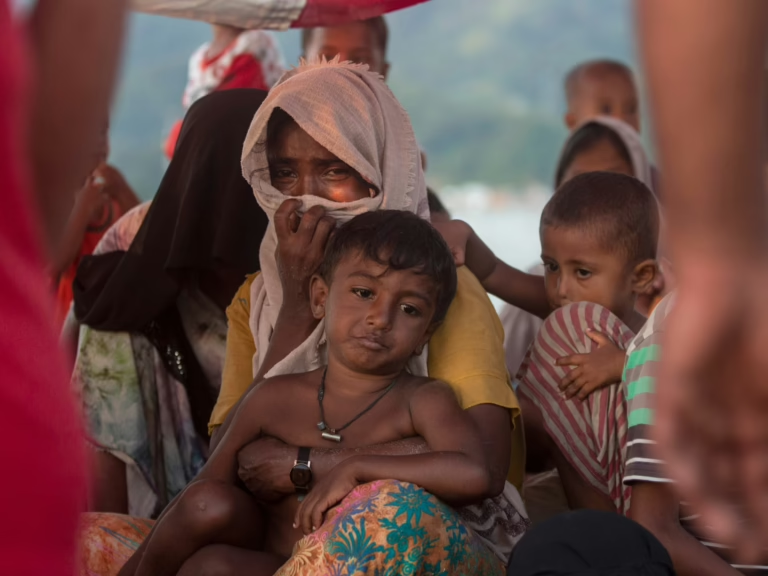New York – Representatives of the Rohingya community, who escaped brutal persecution in Myanmar, spoke at a United Nations General Assembly (UNGA) conference aimed at spotlighting the ongoing hardships faced by this marginalized Muslim minority amid persistent conflict in Myanmar’s Rakhine state.
During a livestreamed address from the expansive UNGA chamber in New York City on Tuesday, Maung Sawyeddollah, founder of the Rohingya Student Network, conveyed a message of solidarity to his community: “Dear brothers and sisters, you remain in our hearts. Even if it seems the world overlooks your pain, the Rohingya have not forgotten you.”
Turning his appeal to global leaders and the United Nations, Sawyeddollah challenged, “It has been over eight years since the Rohingya genocide was brought to light. Where is the justice for the Rohingya? Where?”
He then displayed a haunting image depicting several bodies floating in a river, victims of a drone strike reportedly carried out by Myanmar’s Arakan Army rebels in August 2024.
“These incidents are not random; they form part of a deliberate and systematic campaign,” explained Sawyeddollah, who spent seven years in the Cox’s Bazar refugee camp in Bangladesh after fleeing Myanmar in 2017.
“Why is there no intervention to halt these cruel acts by the Arakan Army?” he questioned.
Wai Wai Nu, executive director of the Women’s Peace Network-Myanmar and another speaker at the UNGA session, described the gathering as a “pivotal moment” she hopes will “refocus the United Nations’ attention on the Rohingya crisis.”
In her remarks, Wai Wai Nu emphasized urgent issues, notably the obstruction of humanitarian aid to Rakhine State, home to many Rohingya, a topic she noted was discussed informally during the conference.
“Securing this aid would validate the purpose of this conference,” she stated.
“We must act to protect the Rohingya still trapped in Rakhine.”
I delivered opening remarks at the #UN General Assembly conference on the Rohingya and other minorities in Myanmar this morning.
I urged ending impunity, immediate action to protect the #Rohingya, advancing justice,& addressing root causes for lasting solutions.#UNGA80 #Myanmar pic.twitter.com/PtSqCf2afM
– Wai Wai Nu (@waiwainu) September 30, 2025
Wai Wai Nu also shared with Al Jazeera that numerous member states underscored the necessity of tackling the root causes of the crisis and promoting justice and accountability during their speeches.
Nonetheless, she pointed out that the conference revealed a “lack of unified leadership and coordination,” particularly within the ASEAN bloc, hindering a cohesive strategy to resolve the Rohingya predicament.
She further advocated for targeted sanctions against Myanmar’s military and all armed factions involved, including the Arakan Army, alongside a comprehensive international arms embargo to safeguard the Rohingya population.
Severe Reductions in Aid
Representing the UN Secretary-General, Chef de Cabinet Earle Courtenay Rattray informed the assembly that drastic cuts in humanitarian assistance have exacerbated the dire situation for over a million Rohingya who fled ethnic cleansing by Myanmar’s military and sought refuge in Bangladesh.
“In just the last 18 months, 150,000 Rohingya have crossed into Bangladesh, a country that has generously kept its borders open and provided sanctuary,” Rattray noted.
Despite Bangladesh’s commendable hospitality, Muhammad Yunus, the country’s chief adviser, expressed concerns over the nation’s capacity to sustain support for Rohingya refugees after eight years of crisis.
“The Rohingya tragedy persists eight years after the genocide began,” Yunus remarked, who co-hosted this meeting and a similar summit in Cox’s Bazar last month to renew focus on the Rohingya plight in Myanmar and Bangladesh.
“Bangladesh is also a victim of this crisis,” he added.
“We bear significant financial, social, and environmental burdens,” Yunus explained.
“With dwindling funds, the only viable peaceful solution is to initiate repatriation.”
He emphasized that the Rohingya have consistently expressed their wish to return home and urged that those who recently fled to Bangladesh due to conflict be allowed to repatriate promptly.
Yunus also highlighted that, unlike Thailand, Bangladesh cannot grant work rights to Rohingya refugees due to its own developmental hurdles, including high unemployment and poverty.
Charles Harder, the U.S. special envoy for future generations, commended Bangladesh and Thailand for hosting Rohingya refugees and announced that the United States would allocate over $60 million in aid for Rohingya in Bangladesh, contingent on Bangladesh implementing meaningful labor access reforms.
However, Harder cautioned that the U.S. cannot shoulder refugee support indefinitely.
“It is imperative that other nations and regional actors devise sustainable solutions for the Rohingya,” he asserted.
Approximately 50 other UN member states participated in the session, though few declared concrete initiatives, with the United Kingdom being a notable exception, pledging $36 million in aid for Rohingya refugees.
Dawda Jallow, Minister of Justice for The Gambia, also spoke, expressing hope for a forthcoming ruling from the International Court of Justice (ICJ) following an oral hearing scheduled for January 2026 concerning The Gambia’s genocide case against Myanmar.
“We initiated this case in November 2019, nearly six years ago. Now, we are preparing for the oral arguments on the merits, set for mid-January 2026,” Jallow stated.
“The Gambia will demonstrate why Myanmar is culpable for the Rohingya genocide and must provide reparations to the victims,” he concluded.

















